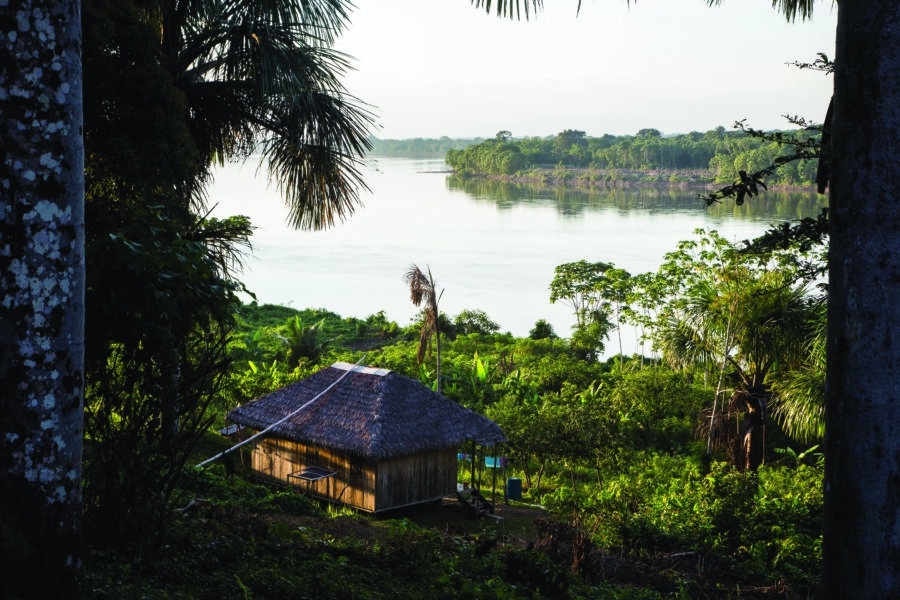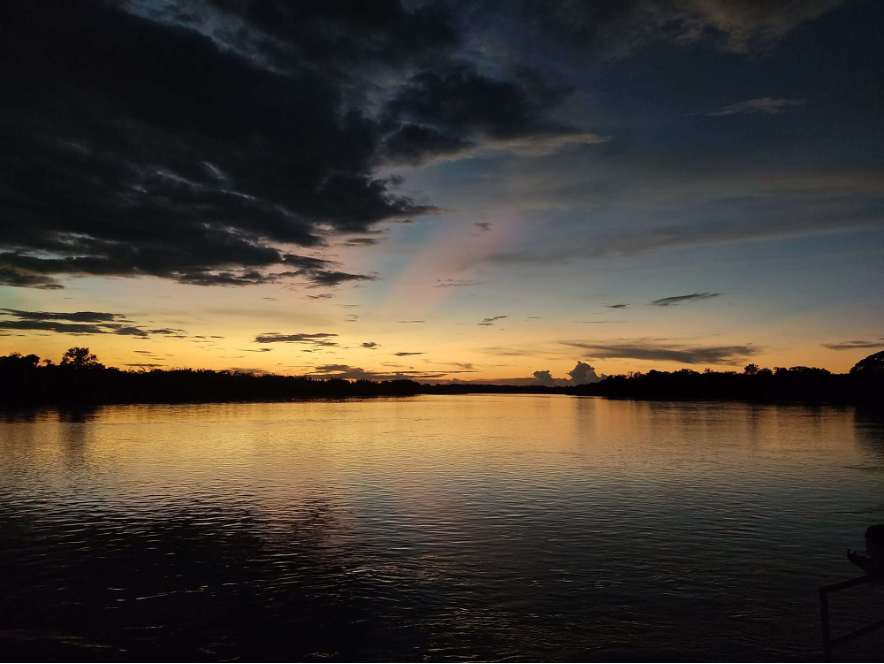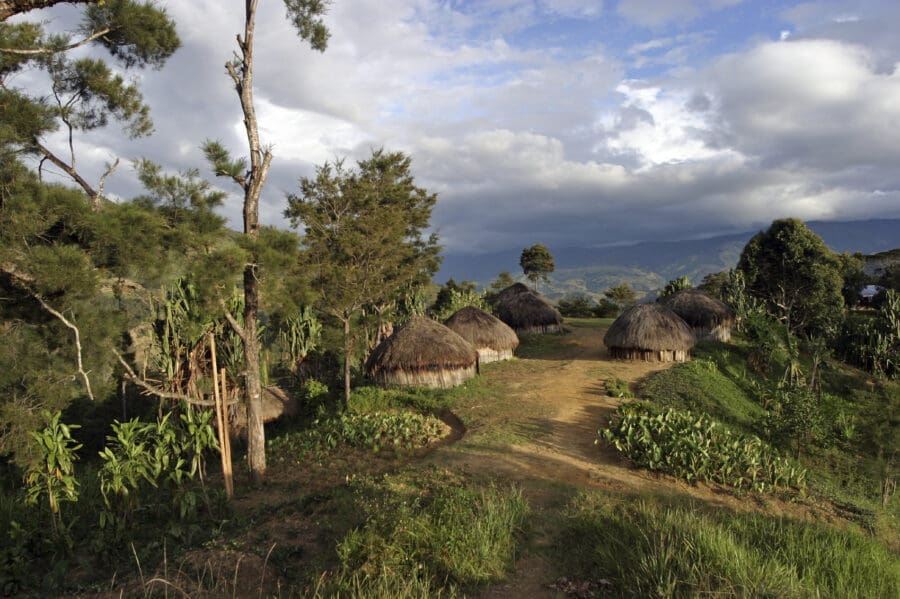On March 23, Lidia Dávila stood in front of a group of over 80 people testifying in the gallery of the public prosecutor’s office in Otavalo Canton, Ecuador. Lidia, who is president of the Land Committee of the Selva Alegre parish in the Imbabura province, with three other leaders, were called for alleged extortive kidnapping against the employees of Servicios Ambientales Rainforest Ecuador (RFEE), just for denying the company entry into their territories.
RFEE is a company that is currently seeking to sell carbon credits based on fraudulent land titles in Ecuador. These titles include territories of eight local communities, including Lidia’s family, that have inhabited the area for more than 100 years.
The dispute between the communities and RFEE began in 2020 when the company acquired a fraudulent title covering 9,190 hectares in the Andes Chocó biogeographic corridor of Ecuador, which includesthe western region of the provinces of Pichincha and Imbabura.This area is home to several protected forests and the ancestral lands of hundreds of local families.
Just days before Lidia and her three colleagues appeared in the public prosecutor’s office, RFEE employees had tried to enter Selva Alegre to private properties of community members to photograph the area. However, the community had blocked their entry, asking for proof of a judicial permit certifying that its title was not fraudulent. This restriction imposed by the communities was the beginning of the criminalization of the four Selva Alegre leaders.
RFEE’s for-profit project to sell carbon credits on the communities’ lands was called “Conservation and Sustainable Management of the UKUMARI Cloud Forest” An advocacy and mobilization campaign was initiated by the communities and their allies, including RRI who is supporting the communities via the ALDEA Foundation (a non-profit organization that supports the environmental and social rights of indigenous and local communities in Ecuador).
One major victory of the communities came when they successfully demonstrated evidence to the international certification body VERRA, to reject the RFEE Ukumari project’s certification, which the company requires to seek international carbon credit funds. The rejection came about following a letter to VERRA from the communities’ partners Rainforest Concern and PARE, which highlighted the project’s irregularities and demanded an investigation*.
However, the communities’ goal goes beyond this: They want RFEE’s fraudulent property title to be nullified so they are no longer in danger of being dispossessed of their lands. To this end, they have created a “land restoration lab”, with the support of RRI via the ALDEA Foundation, as a platform to create advocacy and management tools to defend their land rights and conserve their territories.
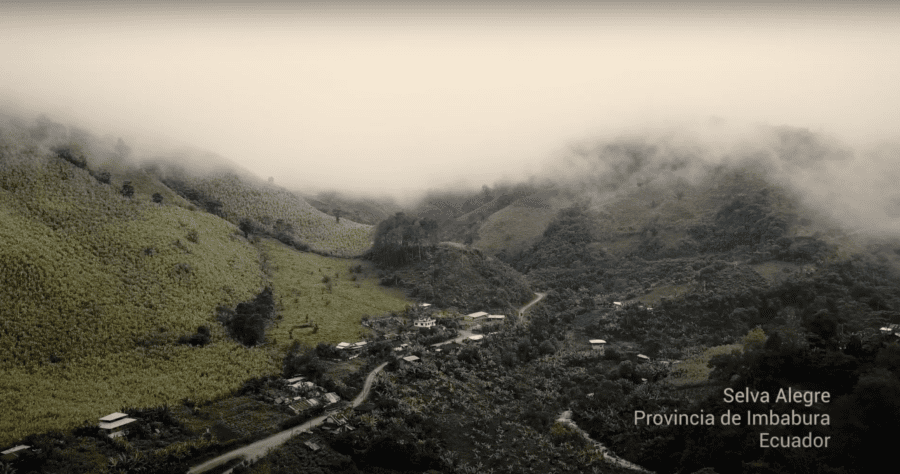
How does the Land Restoration Lab work?
The ‘Land Restoration Lab’ is funded by RRI’s Strategic Response Mechanism (SRM). Its products so far include a media communications strategy led by community youth, and workshops to train community members on territorial mapping using GIS technology. These workshops have led to the creation of an interactive map and a documentary highlighting the territorial conflicts facing Selva Alegre and neighboring parishes, which was launched publicly in April 2023.
The Land Restoration Labworks with the communities’ Land Committee formed by the leaders of the communities affected by the RFEE project and fraudulent land titleCommunity youth elected by the Land Committee received training in GIS and participatory mapping, which made it possible for them to identify the properties of the affected families within the area claimed by RFEE.
“Thanks to this mapping, I can now tell you that 90 percent of my father’s 80 hectares of land are affected by this project,” said Lidia Davila.
The Land Restoration Lab produced an interactive map that compiles data and interviews with local community members, proving that these territories have been inhabited for over 100 years by rural settlers who initially arrived from San José de Minas to find a better future.Others arrived later motivated by the Agrarian Reform and Colonization laws (1964, 1972, 1994) that granted titles to settlers who cleared the land of forest as proof of “productive use”.
Check out the map here.
“I only arrived 28 years ago, but this territory has belonged to local communities since long before that. Our farm belonged to my in-laws, but before that there were also other owners who bought from someone else. These are lands that have been inhabited for many years by farmers who came on foot from San José de Minas, created trails that brought them to what would now be Pamplona, one of the first community in the parish of Selva Alegre,” said Clara Chuga.
Chuga is president of the community of Pamplona in Imbabura Province and a teacher at the only school in the community, which is also within the territories claimed by the company. Clara is one of the four leaders being criminalized by RFEE.
In addition to the mapping, ALDEA Foundation with support of Sacha Manchi Community Film School also trained the communities of Selva Alegre in participatory video and filmed a documentary to highlight the conflict the communities face. According to the Foundation, 70 percent of the affected communities are in one-third of the territory that the company seeks to expropriate located in Imbabura province, while the rest of the conflicted area is in the Pichincha province, in the parish of San José de Minas.
The documentary video, titled Selva Alegre, Tierras en Conflicto (Lands in Conflict). compiles an oral history of these communities and their struggle against dispossession. The documentary, eleased on 4 April 2023, can be watchched here:
Importantly, by being part of the documentary’s production, the community members gained valuable experience and skills they can use to highlight their plight to international audiences.
“Now we can film an event and take better quality photographs to have evidence, conduct interviews, and show what is happening in our communities, something that we did not have before and which the company took advantage of to attack us in different ways,” said Chuga.
According to Lidia, after the release of the documentary video and interactive map, RFEE sought to reach an agreement with the communities: the company would drop the kidnapping charges if they would cease to oppose their project. The communities refused this arrangement.
So the communities are facing huge battles. The accusation against Lidia, Clara, and their colleagues of extortive kidnapping is still open. A request for legal support signed by over a dozen community leaders was denied by the Defensoría del Pueblo (Ombudsman’s Office).
“We do not feel protected by the Ecuadorian state. The Ombudsman’s Office suggested to us that each family that felt harmed by RFEE should have their own lawyer to defend their case. It is as if to say: If you have money, you can defend yourselves. On the other hand, the mayor’s office directed us to Appraisals and Cadastre Office (Oficina de Avaluos y Catastro) who asked us to update our land titles with topographic coordinates, something that the old deeds did not have.Now each person must pay and coordinate to defend their property,” explained Lidia.
Since the community members do not have the economic means to defend themselves against corporate power and state apathy, ALDEA and the Alliance for Human Rights Ecuador (ADHE) is creating a proposal to obtain support for the legal defense of Selva Alegre leaders and the integrity of their legitimate land rights.
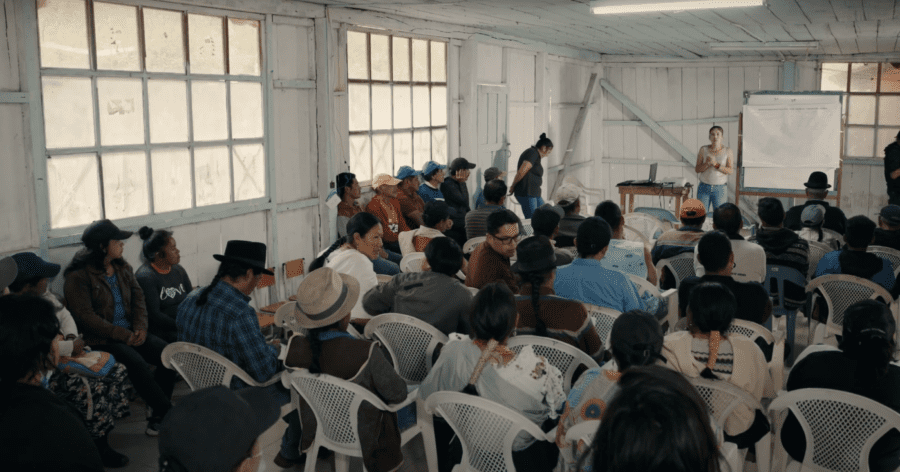
The chase for carbon credits
The fraudulent appropriation of the communities’ lands began long before RFEE acquired its title.
In 2005, a private individual named Martha Pinto sold 80 hectares to a company called UCPEIN which conducted a judicial “inspection” to extend the property from 80 to 9,190 hectares using fraudulent mechanisms, also mentioned in a 2019 report by the Controller’s Office of Ecuador.
With this title, the owners of the company UCPEIN “sold” the land to their mother (initials: MCVT) who between 2009-2015 received more than US$150,000 in conservation incentive payments from the Ecuadorian Ministry of Environment’s Socio Bosque (Forest Partners) Program.
A complaint from the affected communities obliged the program to conduct a series of four inspections in which the irregularities were confirmed. As a result Socio Bosque suspended payments and in 2015 terminated the agreement and demanded the return of all funds received. To date, MCVT (UCPEIN) never made the repayment and instead sold the property with the false land title of 9190 hectares to RFEE.
Private companies using carbon offsets is not a new practice in conservation. According to the Financial Times, this modality is credited to Sheryl Sturges, the chief executive of a coal-fired power plant, who in 1987 proposed to offset the plant’s CO2 emissions by growing trees in Guatemala. The cost of the project was minimal to the company, which attracted the attention of companies engaged in a variety of programs ranging from forestry management to conservation programs around the world. As practices like these become more common, disputes have arisen in cases where private sector actors are not respecting local communities’ rights to their lands/territories and livelihoods, and of Free, Prior and Informed Consent (FPIC), in addition to failing to provide fair compensation under carbon market schemes for carbon sequestered in their territories.
The payment of these credits has been questioned by Afro-descendant and Indigenous communities in countries such as Colombia, due to reduced regulation by governments, while VERRA has been the focus of complaints due to lack of monitoring of certified companies.
In the case of Ecuador, local communities in the San José de Minas and Selva Alegre regions of Pichincha and Imbabura depend on subsistence farming and livestock for their livelihoods.
According to agronomist and conservationist José Cueva, between 2002 and 2010, the parish governments and local communities in both areas were working on an initiative to declare the areas of Paso Alto and Quinde as community-based protected forest reserves. Although Paso Alto was legally declared by the Ministry of Environment (MAE) in 2010, the request for the Quinde Forest was denied since MAE’s Socio Bosque program had recently concessioned the entire area to MCVT (UCPEIN) to receive “conservation incentives” of over $30,000 annually.
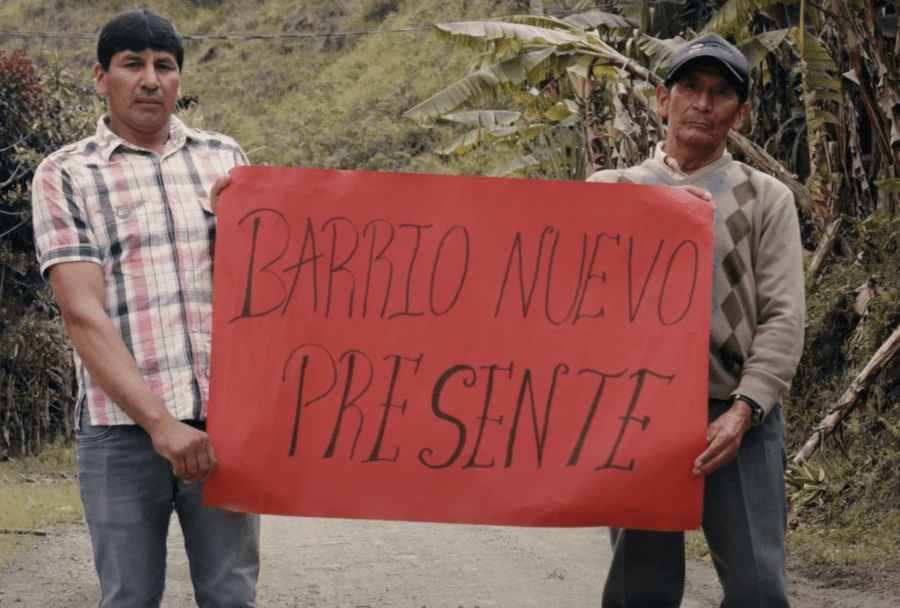
Going forward
All these communications tools seek to accompany the legal strategy that the communities carry out and help strengthen the protection and governance of the territories.
After presenting these results publicly and demonstrating organized grassroots empowerment, the communities of Selva Alegre, San José de Minas, and Quichinche will continue with legal processes to nullify RFEE’s false land title.
From there the communities hope to finally carry out their plans to conserve and govern their lands and forests using their traditional knowledge and adopting regenerative agroforestry systems, as well as creating livelihood opportunities such as community-based eco-tourism.
*Since the UKUMARI project was rejected by VERRA, the name of the project has been changed to “Bosque de Neblina en el Chocó Andino”



